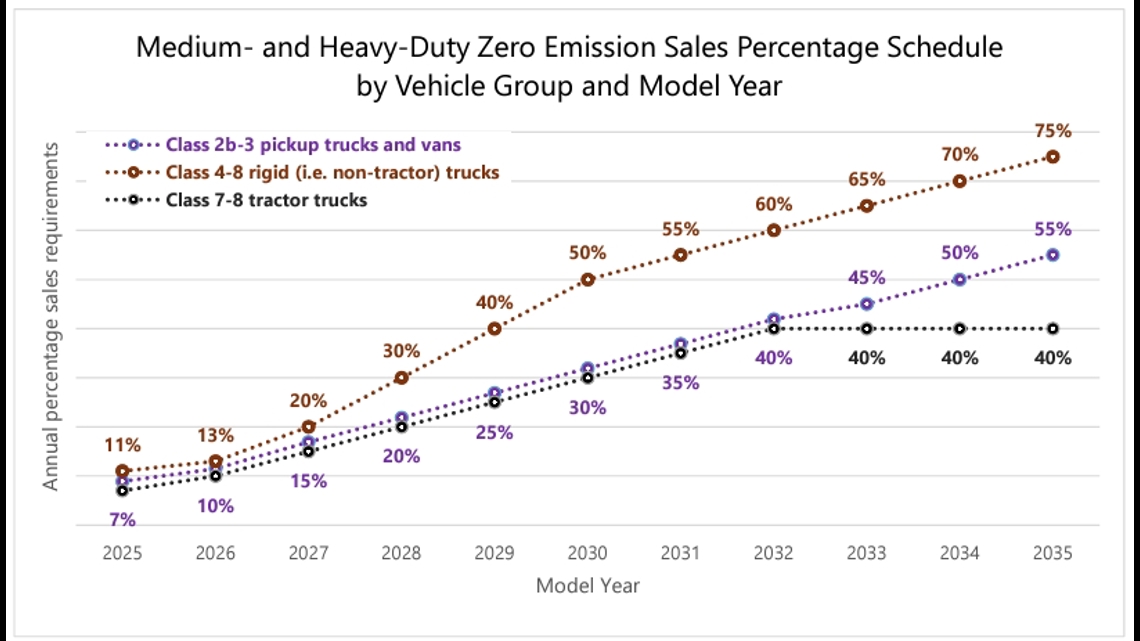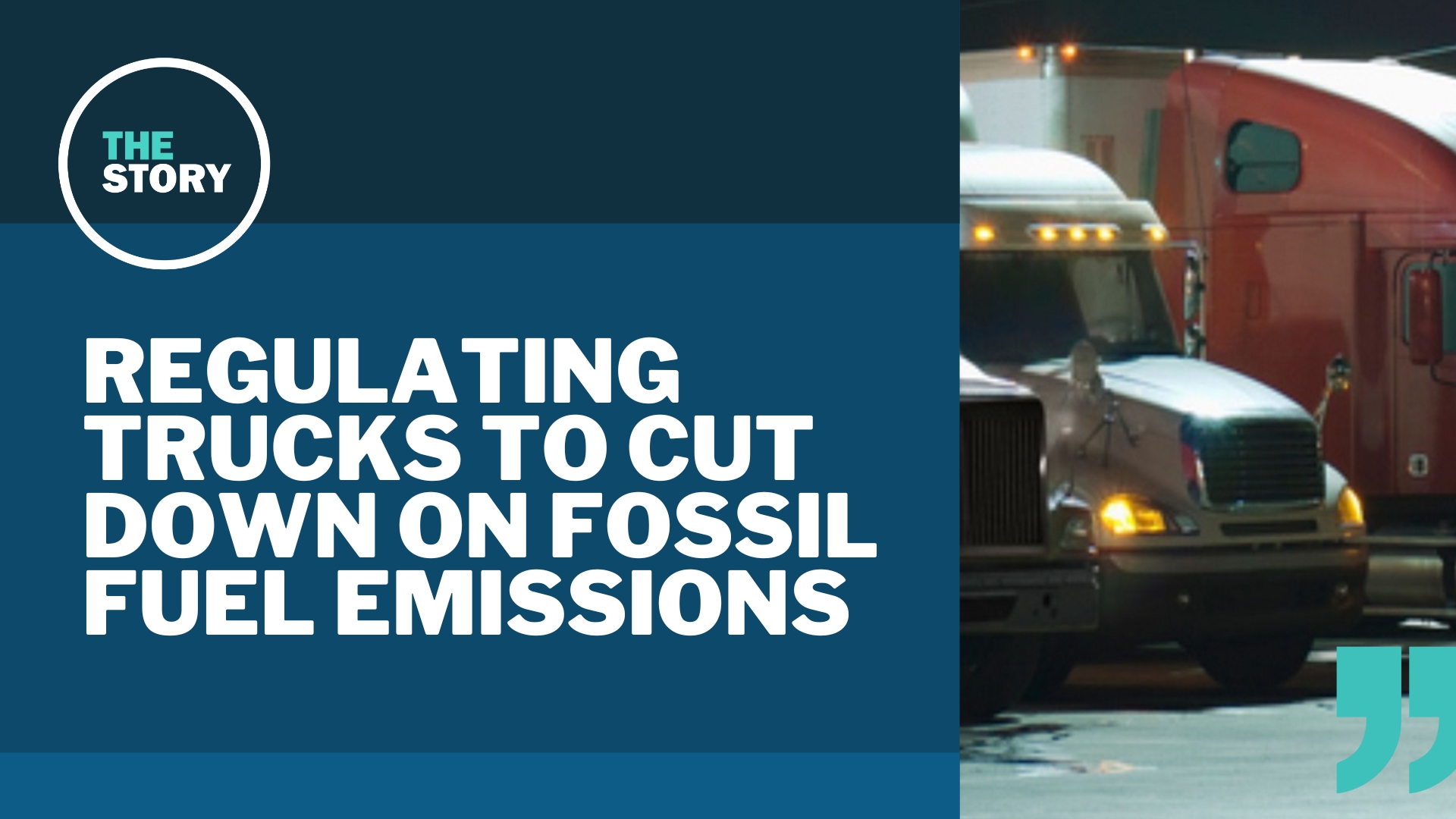OREGON, USA — Oregon is looking to reduce carbon emissions, and in a few weeks, a new rule will go into place aimed at reducing the number of trucks on the road that use gas.
The Advanced Clean Truck rule, first introduced in California, mandates that manufacturers increase the percentage of zero-emission trucks they sell. Oregon is following California's lead, and our state's rules start January 1, 2025.
The percentage of zero-emission vehicles they're required to sell is set to increase over the next decade. The exact percentage varies by type of truck next year is 7% for models, like tractor trucks, to 11% for rigid trucks, like box trucks. The percentage will go up over time until 2035, when 75% of the rigid trucks on the road are expected to be zero emission: 55% of pickups and 40% of tractor trucks.


But Rep. Shelly Boshart Davis, a Republican representing the Albany area, is hoping the plan will be delayed. She knows the trade, hailing from a trucking family, as well as owning and operating a 35-truck operation.
Rep. Boshart Davis says right now, she doesn't think Oregon has the infrastructure in place to support electric trucks, and in some cases, the vehicles themselves don't exist.
"The heavy-duty pickup — think of your F-250 or F-350 — there are no plug-in electric vehicle options. They just are not available," she explained, adding that the same concept applies to RVs — and if those did exist, they'd have a hefty price tag.
"And then you also look at your over-the-road heavy duty truck — the gross vehicle weight rating isn't there," she continued. "You can only haul up to 80,000 pounds with that, even though here in Oregon, we can haul up to 105,500 (pounds). Also, if you were to drive through Oregon on I-5 from Washington to, say, California, there is nowhere other than one place in Portland that has a commercial supercharger in order to even plug in your heavy duty over-the-road truck."
Oregon's Department of Environmental Quality (DEQ) says manufacturers will have some flexibility in what they sell while the market develops new EVs, so if they don't have big EV trucks or RVS to sell, they can meet those percentages by selling things like electric school buses instead.
In fact, the Environmental Protection Agency (EPA) Wednesday announced around $6 million in grant funding to help the state buy 26 zero-emission school buses. The money will also go toward creating chargers for the buses.
Oregon DEQ said that the state is also investing in bringing new chargers online, with one set to break ground along I-5 in the Salem area next year: "We recently received $102 million in funds, along with California and Washington, under the Charging and Fueling Infrastructure grant to install electric charging stations and hydrogen stations along I-5. Oregon is receiving $21 million to install two publicly accessible MHD charging stations and one hydrogen station."
But Boshart Davis says she'd rather see some middle ground, such as incentives for people to buy newer trucks that still run on gas but with fewer emission than older trucks. However, she thinks zero-emission trucks can work for some industries.
"I think this works in some applications, like garbage trucks, delivery vans, those that start (and) stop every night and where this equipment is actually available. ... Encourage those businesses and encourage those applications to go ahead and upgrade if they want to," she advised. "I would suggest if the market wanted these types of vehicles, then we wouldn't need these mandates in order to push them to buy them that they would be readily available."
Oregon DEQ said they expect the majority of zero-emission vehicles in Oregon will fall under that category, driving less than 100 miles per day and charging at a private home base rather than a public charger.
The dangers of diesel
Oregon DEQ is also thinking about developing a policy around diesel emissions.
Diesel fuel powers most freight and delivery trucks, as well as some trains, buses, boats, farm equipment and generators used for backup power at hospitals. However, diesel exhaust also contributes to a lot of health problems.
Most of the diesel exhaust is concentrated along the I-5 corridor, mostly in the Portland area, according to DEQ data.
The agency held a listening session for people and industries that rely on diesel on what they should keep in mind when developing a policy. Many of them, including the Oregon Farm Bureau, said there isn't any equipment on the market that can perform the same as diesel power.
"It provides the horsepower, power transfer, longevity that no current technology offers," the organization said. "The economics associated with agriculture activity make it difficult to access the capital necessary to retrofit or replace older equipment. All of this equipment that is being used is critical to Oregon's farm and ranching economy."
The organization did note that the actual usage of the farm equipment needs to be taken into account. For instance, they said, there might be some that aren't used that often — for example, four hours a year. Some may also have backup trucks for when their regular ones are at the garage.
"Our farm equipment is expensive, it's highly specialized, it's often used for a limited number of hours in a year," the Oregon Farm Bureau stressed.
Long-haul truckers had the same kind of feedback as Boshart Davis: the charging infrastructure isn't there, and electric trucks can't haul as much.
Take it from two tow truck drivers who clean up big truck crashes: "Those accidents can often go from two to 12 hours on scene, and the technology for heavy duty recovery towing equipment — especially in the EV world — just does not exist, and we don't know when that will be available to us."
But the American Lung Association was adamant about that the health concerns around diesel are urgent.
"The thing we really want to emphasize is that the health benefits of transitioning to zero-emission vehicles market wide are uniquely significant," the agency argued. "Our Delivering Clean Air Report finds that a transition to zero-emission trucks paired with renewable energy would provide Oregon with 1.1 billion in public health benefits and avoid 103 premature deaths; 2,553 asthma attacks; and 12,000 lost workdays over the coming decades."

